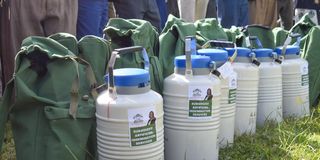Nakuru dairy farmers embrace AI to improve milk production

Farmers in Kuresoi south display the AI kits received from the county administration.
There are two types of small-scale dairy farmers in our county.
The first is the one whose cows seem to lead carefree lives.
They spend their days grazing around in open fields eating barely nutritious and just plain grass and retreat in the evening after a day’s roaming- whether in the urban or rural setup.
The other farmers have embraced keeping their cows in well-ventilated barns and eating their fill from troughs of mixed commercial feed and high-protein fodder.
The former, although concerned about their low milk production and the quality of breed, pays little attention to that mainly because it is an expensive affair to buy high-quality semen and may be uninformed of the simple high protein fodder crops to feed their livestock.
Through a paradigm shift, a few are now embracing the use of artificial insemination (AI)- a technique in which sperm cells from a male animal are manually deposited into the reproductive tract of a female- to improve the genetic quality of their livestock and productivity.

Farmers in Kuresoi south will now benefit from AI kits at a subsidized price.
Farmers like David Rotich, Chairman of Olengoruone Dairy Cooperative Society, who now produces an average of 9,000 litres per day, have high expectations that their milk production will soar in two or three years.
He also notes that the quality of their dairy animals will improve after receiving artificial insemination (AI) kits and the service being capped at Sh. 800 by the county government.
“We’ve been receiving AI services from private service providers and sometimes you may not get the right quality of semen. It's also a bit expensive as it ranges between Sh. 2,500 to Sh. 4,500, which may be out of reach for many average farmers," he says.
Janet Chumo, Chairlady of Keringet Foods Cooperative who during peak season produces about 13,000 litres, shares the same sentiments as her counterpart that the service is expensive to farmers.
"We were only serving 70 farmers out of the 2,000 registered, which translates to a tiny percentage. We also saw many of our farmers use the bulls because of the cost. With the subsidized program, we will be able to get good breeds and improve our milk production."
Nakuru's milk production capacity is a Sh. 13.9 billion industry that not only satiates the county's appetite for milk, yogurt, and other value-added products but the nation’s as well.
